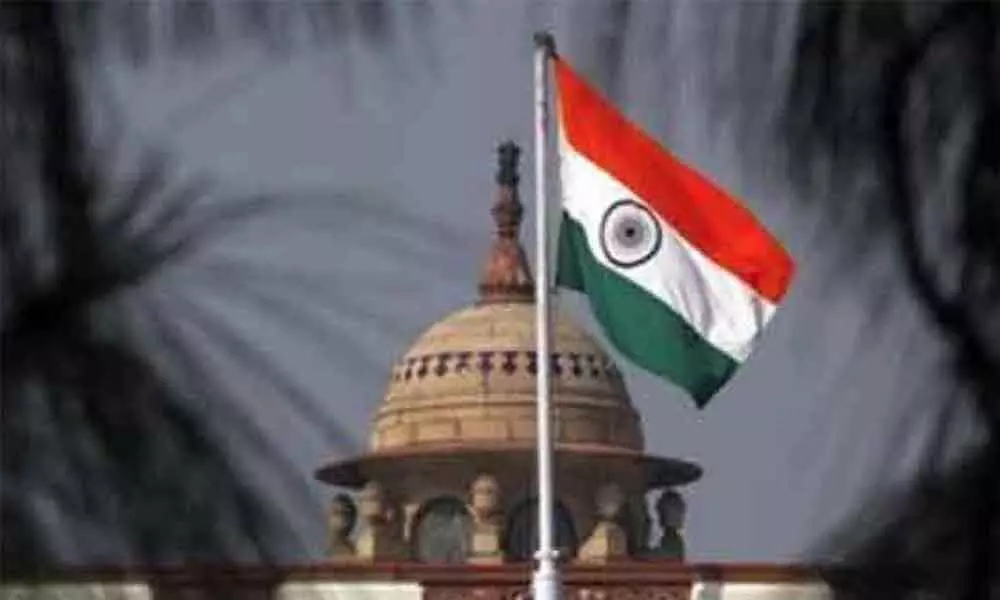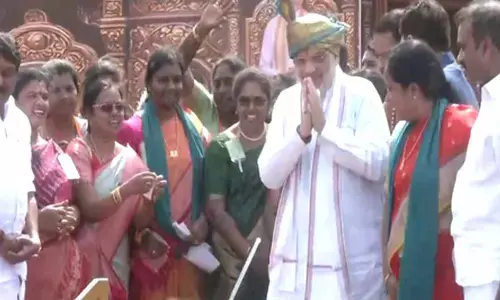India should make a clean break from its feudal past

India should make a clean break from its feudal past
India is a Civilisational State engaged in a "grand undertaking to re-architect" the Republic. It should make a "clean break" from its "socialistic, feudal past" to maintain the momentum and should stake claim to be a world power, says a new book on the country's journey as it approaches the 75th year of its Independence, even as it calls for course corrections in the areas of governance, bureaucracy, foreign policy and the judiciary.
India is a Civilisational State engaged in a "grand undertaking to re-architect" the Republic. It should make a "clean break" from its "socialistic, feudal past" to maintain the momentum and should stake claim to be a world power, says a new book on the country's journey as it approaches the 75th year of its Independence, even as it calls for course corrections in the areas of governance, bureaucracy, foreign policy and the judiciary.
What then, are the course corrections required? In the area of foreign policy, the book says, the size of the country's diplomatic corps "is tiny" compared to its global ambitions - there are only 2,700 staff members and 912 Indian Foreign Service (IFS) officers, with countries like China (4,500), Japan (5,700), France (6,000) and the US (20,000) way ahead.
Not only should India ramp up its diplomatic strength, the selection process needs to be revamped with a separate exam to select foreign (service) officers assessing them on "parameters such as international aptitude, curiosity about the world, knowledge or demonstrated interest in foreign affairs and communications skills", as recommended by a parliamentary panel, the book says.
It noted in this context that External Affairs Minister S. Jaishankar had, in February 2020, implemented a comprehensive restructuring of the ministry, initiating long-overdue administrative reforms necessary to align it with India's changed trade and security objectives.
But then, the IFS is not the only civil service facing capacity constraints. A staggering 1,449 IAS posts -- 22 per cent of the sanctioned strength -- and 970 IPS posts -- 19.94 of the sanctioned strength -- are lying vacant.
"As for police forces across the country, over five lakh posts are vacant, with the highest - around 1.80 lakh -- being in Uttar Pradesh (India's largest by population and the most significant politically).
Why is it surprising then, that there is no rule of law and any group can extract special benefits from the State based on its potential for violence," the authors ask.
Then, the brief of the civil service is to execute the policy of the government of the day. "The argument that the bureaucracy acts as a check on the whims and fancies (even corrupt proclivities) of politicians isn't sound. That's not their job, but that of other institutions entrusted specifically with the task of maintaining transparency," the book says.
It also speaks of the need for bureaucrats to be given ample time to develop expertise based on their interest and governmental needs. For instance, after every bureaucratic reshuffle, it's quite common, for example, that the urban development secretary has taken charge as the home secretary, the information and broadcasting secretary is shifted to personnel and training and the steel secretary has moved to the finance ministry.
"Such a system, based primarily on generalists, does not allow officers to build domain expertise and is highly detrimental to the administrative efficiency," the authors write. As for governance, the book states it rather pithily: "The truth is that almost India's half of ministries could vanish tomorrow and nobody would miss them".
Why has it come to such a pass? "Ministries have to be literally invented to accommodate leaders and, when required, coalition partners. This situation also arises as India's polity is also restricted when it comes to internal democracy."
"Who Judges the Judges", the book asks and points to the telling example of the National Judicial Appointments Commission (NJAC), whose creation had been approved by both houses of Parliament, ratified by 16 state legislatures and finally assented to by the President of India.
The Supreme Court, however, struck it down 4-1 on the ground that it violated the "basic structure" of the Constitution - but did not recommend or suggest a better framework.
The current Collegium system of appointments, the book says, "has given rise to nepotistic tendencies in the judiciary which the Constitution makers would never have fathomed - the rot is so deep that it competes with the scourge of dynastic politics, but while the latter has been widely critiqued and has to pass frequent electoral tests, the lack of public knowledge about the extent of dynastic sway in the legal world has saved the judicial establishment from scrutiny".
There have been rare instance, though. Of the 28 incumbent Supreme Court judges, Outlook magazine reported in 2016, 11 "had either judges or legal luminaries as relatives". Read this book- it provides you much to ponder over.















